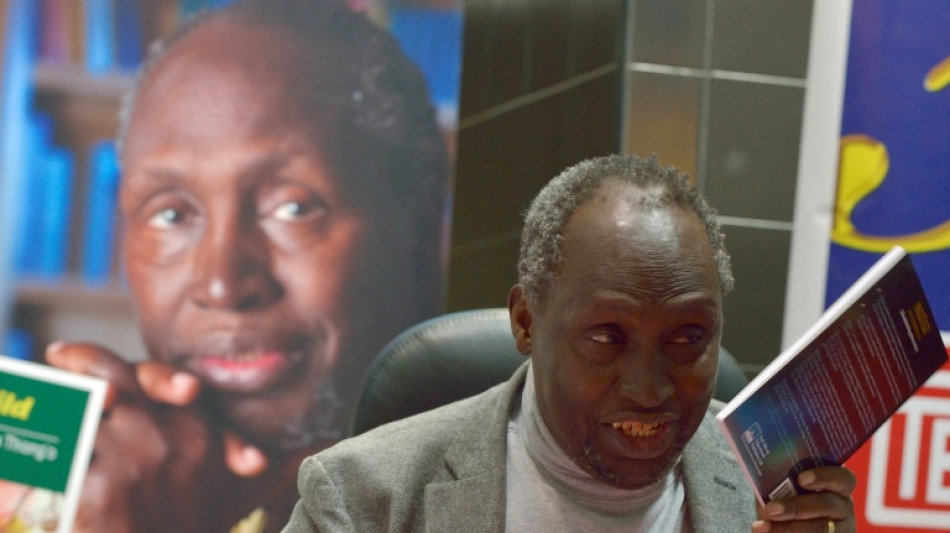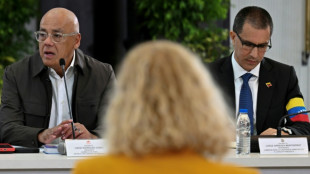
-
 Argentina govt launches account to debunk 'lies' about Milei
Argentina govt launches account to debunk 'lies' about Milei
-
Australia drug kingpin walks free after police informant scandal

-
 Dupont wants more after France sparkle and then wobble against Ireland
Dupont wants more after France sparkle and then wobble against Ireland
-
Cuba says willing to talk to US, 'without pressure'

-
 NFL names 49ers to face Rams in Aussie regular-season debut
NFL names 49ers to face Rams in Aussie regular-season debut
-
Bielle-Biarrey sparkles as rampant France beat Ireland in Six Nations

-
 Flame arrives in Milan for Winter Olympics ceremony
Flame arrives in Milan for Winter Olympics ceremony
-
Olympic big air champion Su survives scare

-
 89 kidnapped Nigerian Christians released
89 kidnapped Nigerian Christians released
-
Cuba willing to talk to US, 'without pressure'

-
 Famine spreading in Sudan's Darfur, UN-backed experts warn
Famine spreading in Sudan's Darfur, UN-backed experts warn
-
2026 Winter Olympics flame arrives in Milan

-
 Congo-Brazzaville's veteran president declares re-election run
Congo-Brazzaville's veteran president declares re-election run
-
Olympic snowboard star Chloe Kim proud to represent 'diverse' USA

-
 Iran filmmaker Panahi fears Iranians' interests will be 'sacrificed' in US talks
Iran filmmaker Panahi fears Iranians' interests will be 'sacrificed' in US talks
-
Leicester at risk of relegation after six-point deduction

-
 Deadly storm sparks floods in Spain, raises calls to postpone Portugal vote
Deadly storm sparks floods in Spain, raises calls to postpone Portugal vote
-
Trump urges new nuclear treaty after Russia agreement ends

-
 'Burned in their houses': Nigerians recount horror of massacre
'Burned in their houses': Nigerians recount horror of massacre
-
Carney scraps Canada EV sales mandate, affirms auto sector's future is electric

-
 Emotional reunions, dashed hopes as Ukraine soldiers released
Emotional reunions, dashed hopes as Ukraine soldiers released
-
Bad Bunny promises to bring Puerto Rican culture to Super Bowl

-
 Venezuela amnesty bill excludes gross rights abuses under Chavez, Maduro
Venezuela amnesty bill excludes gross rights abuses under Chavez, Maduro
-
Lower pollution during Covid boosted methane: study

-
 Doping chiefs vow to look into Olympic ski jumping 'penis injection' claims
Doping chiefs vow to look into Olympic ski jumping 'penis injection' claims
-
England's Feyi-Waboso in injury scare ahead of Six Nations opener

-
 EU defends Spain after Telegram founder criticism
EU defends Spain after Telegram founder criticism
-
Novo Nordisk vows legal action to protect Wegovy pill

-
 Swiss rivalry is fun -- until Games start, says Odermatt
Swiss rivalry is fun -- until Games start, says Odermatt
-
Canadian snowboarder McMorris eyes slopestyle after crash at Olympics

-
 Deadly storm sparks floods in Spain, disrupts Portugal vote
Deadly storm sparks floods in Spain, disrupts Portugal vote
-
Ukrainian flag bearer proud to show his country is still standing

-
 Carney scraps Canada EV sales mandate
Carney scraps Canada EV sales mandate
-
Morocco says evacuated 140,000 people due to severe weather

-
 Spurs boss Frank says Romero outburst 'dealt with internally'
Spurs boss Frank says Romero outburst 'dealt with internally'
-
Giannis suitors make deals as NBA trade deadline nears

-
 Carrick stresses significance of Munich air disaster to Man Utd history
Carrick stresses significance of Munich air disaster to Man Utd history
-
Record January window for transfers despite drop in spending

-
 'Burned inside their houses': Nigerians recount horror of massacre
'Burned inside their houses': Nigerians recount horror of massacre
-
Iran, US prepare for Oman talks after deadly protest crackdown

-
 Winter Olympics opening ceremony nears as virus disrupts ice hockey
Winter Olympics opening ceremony nears as virus disrupts ice hockey
-
Mining giant Rio Tinto abandons Glencore merger bid

-
 Davos forum opens probe into CEO Brende's Epstein links
Davos forum opens probe into CEO Brende's Epstein links
-
ECB warns of stronger euro impact, holds rates

-
 Famine spreading in Sudan's Darfur, warn UN-backed experts
Famine spreading in Sudan's Darfur, warn UN-backed experts
-
Lights back on in eastern Cuba after widespread blackout

-
 Russia, US agree to resume military contacts at Ukraine talks
Russia, US agree to resume military contacts at Ukraine talks
-
Greece aims to cut queues at ancient sites with new portal

-
 No time frame to get Palmer in 'perfect' shape - Rosenior
No time frame to get Palmer in 'perfect' shape - Rosenior
-
Stocks fall as tech valuation fears stoke volatility


Kenya's Ngugi wa Thiong'o, champion of African expression
During his imprisonment, Kenyan author Ngugi wa Thiong'o decided he would never write in English again, a defiant move that helped put literature in African languages firmly on the map.
Ngugi died at the age of 87 on Wednesday, his daughter announced on Facebook.
"It is with a heavy heart that we announce the passing of our dad, Ngugi wa Thiong'o this Wednesday morning," wrote Wanjiku Wa Ngugi. "He lived a full life, fought a good fight."
Widely regarded as east Africa's most influential writer, Ngugi sought to forge a body of literature reflecting the land and people from which he came, and not follow in the footsteps of Western tradition.
"I believe so much in equality of languages. I am completely horrified by the hierarchy of languages," he told AFP in an interview in 2022 from California, where he lived in self-imposed exile.
His decision in the 1970s to abandon English in favour of his native Kikuyu, as well as Kenya's national language Swahili, was met with widespread incomprehension at first.
"We all thought he was mad... and brave at the same time," said Kenyan writer David Maillu. "We asked ourselves who would buy the books."
Yet the bold choice built his reputation and turned him into an African literary landmark.
The softly-spoken writer also lived a life as dramatic as his novels.
His criticism of post-colonial Kenya -- describing the violence of the political class and the newly rich as "the death of hopes, the death of dreams and the death of beauty" -- brought him into frequent conflict with the authorities.
- 'Decolonising the mind' -
Born James Ngugi into a large peasant family in Kenya's central Limuru region on January 5, 1938, he spent the first 25 years of his life in what was then a British settler colony.
His early works were heavily influenced by his country's battle against colonial rule and the brutal Mau Mau war of 1952-1960.
In his first collection of essays, "Homecoming", he described himself as a "stranger in his home country".
But his anger would later extend to the inequalities of post-colonial Kenyan society, incurring the wrath of the government.
In 1977, Ngugi and fellow writer Ngugi wa Mirii were jailed without charge after the staging of their play "Ngaahika Ndeenda" ("I Will Marry When I Want").
It was then that he decided to write his first novel in Kikuyu, "Devil on the Cross", which was published in 1980.
He had already abandoned his "English" name to become Ngugi wa Thiong'o.
"I wrote it on the only paper available to me, which was toilet paper," he told US radio broadcaster NPR.
Amnesty International named him a prisoner of conscience, before a global campaign secured his release from Kamiti Maximum Security Prison in December 1978.
As early as 1965, Ngugi's novel "The River Between" embarked on a critical examination of the role of Christianity in an African setting.
"If the white man's religion made you abandon a custom and then did not give you something else of equal value, you became lost," he wrote.
He went into self-imposed exile in 1982 after a ban on theatre groups in Kenya, moving first to Britain then to the United States.
In 1986, he published one of his best-known works, "Decolonising the Mind", a collection of essays about the role of language in forging national culture, history and identity.
- 'A Kenyan Tolstoy' -
When Ngugi returned home on a visit in 2004, he was mobbed by supporters at Nairobi's airport.
"I have come back with an open mind, an open heart and open arms," he declared.
Days later, he and his wife were attacked by armed men: she was raped and he was beaten up. It was not clear whether robbery was the sole motive or whether the assault was politically motivated.
Margaretta wa Gacheru, a sociologist and former student of Ngugi, described him as a national icon.
"To me he's like a Kenyan Tolstoy, in the sense of being a storyteller, in the sense of his love of the language and panoramic view of society, his description of the landscape of social relations, of class and class struggles," she said.
In addition to fiction, the father-of-three, who became a professor of comparative literature at the University of California Irvine, also published essays and three memoirs.
His most recent book was the genre-defying novel-in-verse "The Perfect Nine", which he translated into English in 2020.
It recounted the founding of the Kikuyu people, blending folklore and allegory.
From widening economic inequality to the lingering trauma of racism, the issues raised in the play still persist in Kenya and beyond, a fact not lost on its creator.
"I am an activist, I want to see change," Ngugi told AFP.
"I hope we can continue striving for that world. We cannot give up."
A.Suleiman--SF-PST

